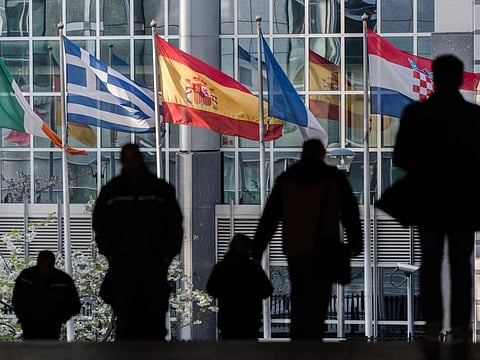Working to destroy the EU from within
Anti-EU parties may win 35% of seats in the new European Parliament

In a month’s time, European voters will head to the polls to elect a new European Parliament that sits in Strasbourg. That the parliament sits there, on the French side of the River Rhine, is highly symbolic — reflecting that the region had been German territory on and off for parts of the preceding century.
The entire European Union project has been fuelled by a desire to never again repeat the mistakes of history, where Europe was ripped asunder by two cataclysmic conflicts, and to build peace and prosperity across the continent.
As things stand right now, no one knows — not even the Brits themselves — whether the United Kingdom will be taking part in the Euro elections, where the other 27 EU states will elect 705 Members of the European Parliament (MEP), or 755 if the British do vote.
Those MEPs will be charged with passing EU legislation, overseeing the European Commission — the cabinet-like structure that oversees the day-to-day operations of the EU — and, most critically now, shaping the long-term budget needs of the EU for the next five years. The final say on that budget, however, rests with the European Council — the politicians who lead the individual 27 EU member-states. Those Euro elections take place between Thursday May 23 and Sunday May 26, depending on the voting traditions of the individual member states, but there is polling somewhere across those four days.
Just how each member-state elects its MEPs depends entirely on the traditions and systems used there. There are first-past-the-post elections, elections using single transferable votes, closed lists, open lists — the ultimate smorgasbord for political scientists and researchers looking at trends and voting patterns for years to come.
In Italy, MEPs are elected to represent a region. In Germany, its 96 MEPs represent the entire country for its 83 million people. Little tiny Malta, with a population of less than 500,000, elects six MEPs.
But what’s really troubling is that when the first direct elections to the European Parliament were held in 1979, the voting turnout was 62 per cent. Five years ago, pan-European participation rates had declined to 42 per cent. And given that voting is theoretically compulsory in Belgium, Greece and Bulgaria, that decline in voter turnout reflects a growing disinterest in the European project.
And for those deeply committed to making sure that the project is successful and helps drive a common market of more than 500 million people in the world’s third-largest trading bloc, that growing apathy is alarming. So too is the growing support for parties on both the left and the right who are actively campaigning to end their nation’s participation in the EU, or to scale it back to the point of political insignificance if not economic benefit.
Within the European Parliament itself, like-minded MEPs sit in groupings, much like very loose political parties — they are bound more by a very broad philosophy and political expediency rather than a firm commitment to strict party rules.
A natural home
Even though it’s a month before voting starts, there are already fears that anti-EU parties are likely to form the second-largest bloc in the new parliament. The European Council on Foreign Relations (ECFR) predicts that there will be three major coalition blocs — the current centre-right European People’s Party group; the centre-left alliance of Socialists and Democrats; and what it says will be an “anti-European” bloc made up of several elements.
It’s into this bloc that the likes of Alternative for Germany, Italy’s League, Spain’s Vox, MEPs from National Rally, formerly the National Front in France, or MEPs from the Right in Austria and the Netherlands will sit. And if indeed the Brits do vote, it’ll be a natural home too for Brexiteer MEPs.
The ECFR also says that for the first time, the usual grand coalition between the European People’s Party and the Socialists and Democrats may not have enough members to be able to fully control the parliament as before.
The ECFR drew on polling data from across each of the EU states and reports that anti-EU parties could win 35 per cent of seats in the new parliament. It does issue a caveat, however, noting that the anti-EU bloc will be made up of MEPs elected by the far-right and the far-left, making it difficult for them to work together cohesively, and will united only in attempting to thwart progress.
When those new MEPs get to Strasbourg, they might well take a look across the River Rhine and imagine what could be, if not indeed for the EU’s work over the past decades.


